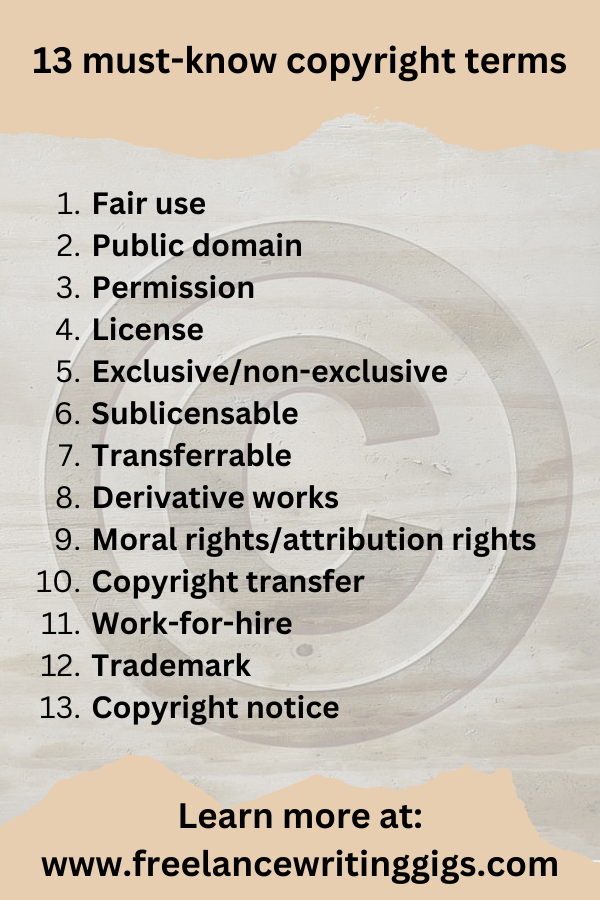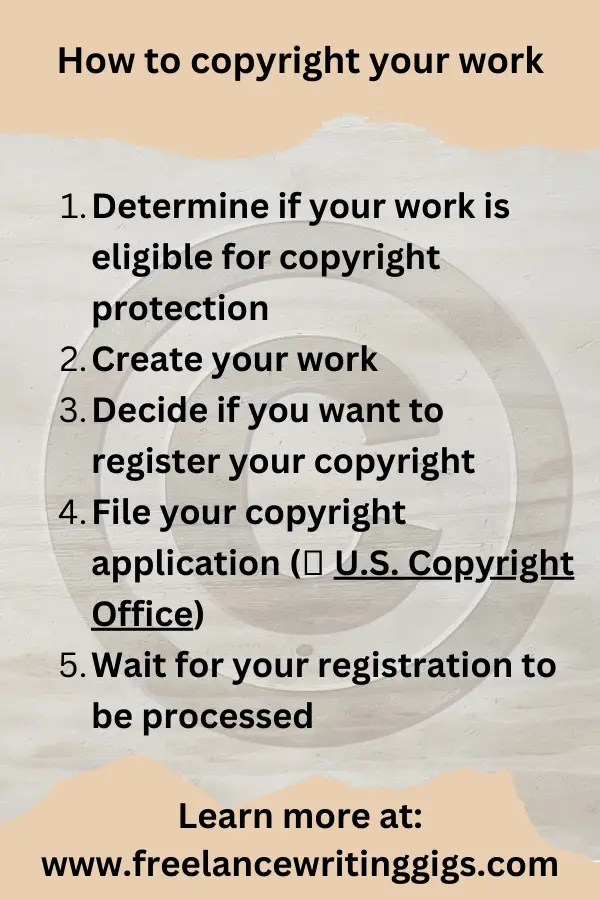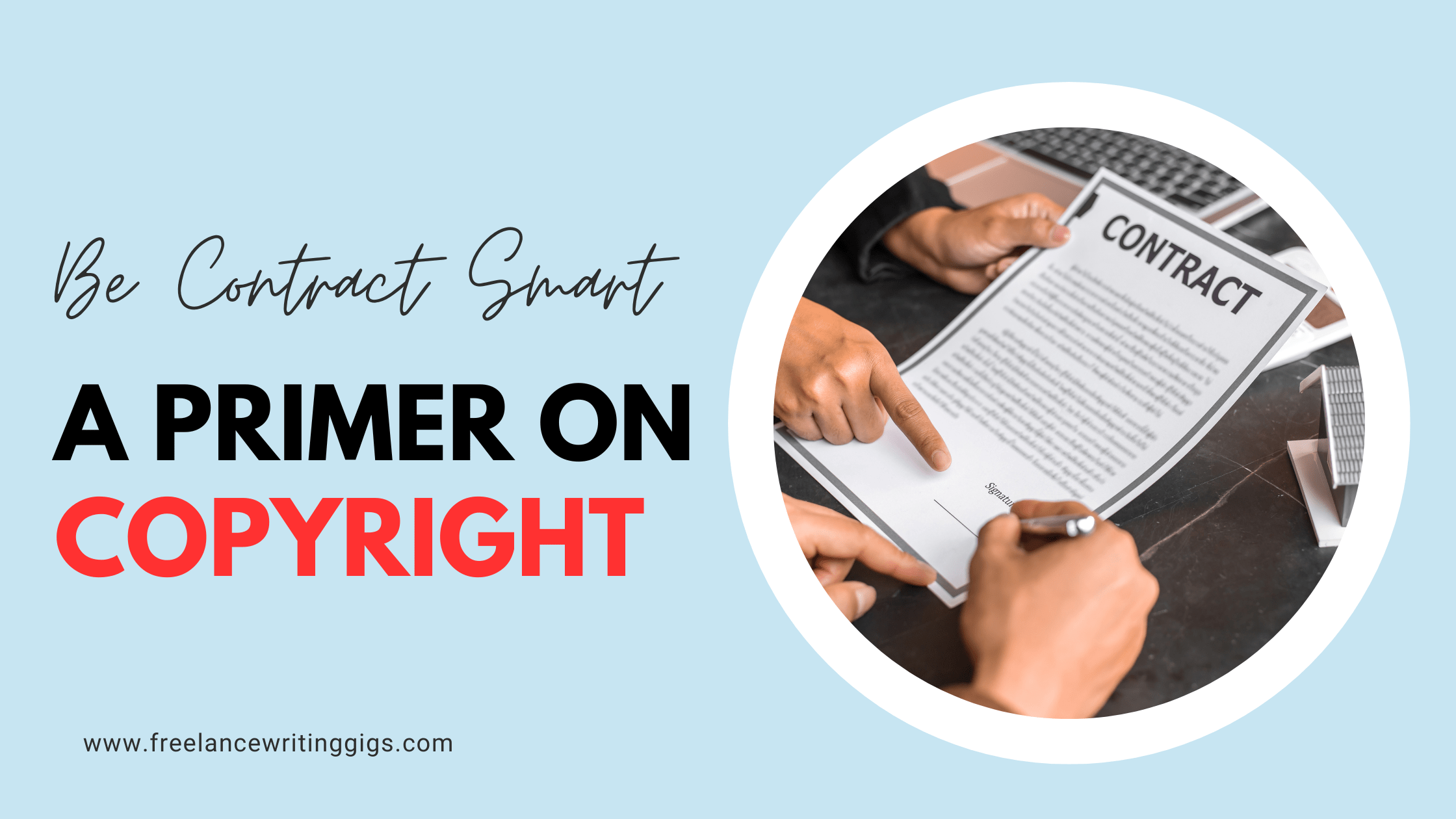One thing nearly every freelance writer is going to have to do is sign a contract. Contracts, when written well, protect both the freelancer and the client by avoiding any confusion and preventing anyone from giving up any rights that they didn’t intend.
But as necessary and as useful as contracts are, they are often filled with terms that can cause confusion. Many freelancers, intimidated either by the size or the seeming complexity of their contracts, often just sign them with little more than a cursory glance. This is a poor move that can cause a freelancer to sign a bad deal with no legal recourse against it.
This is especially true when it comes to copyright, an already confusing area of law made even more so by the terms and conditions of many contracts. As such, you have to arm yourself with at least basic knowledge of copyright facts.
However, most of the terms related to copyright are actually fairly self-explanatory, making the section easy to understand. But, if you know a few additional key terms you can easily figure out what rights you’re signing away to your work and whether you are comfortable with it.
In this article, we look at 13 of the key terms that you need to know regarding copyright when reviewing a contract, what they mean, and what to look for.
What is Copyright?
But first, let’s make sure we know the basics. What is copyright anyway?
Copyright is a legal right that grants the creator of an original work exclusive rights to use and distribute that work. It is a form of intellectual property law that protects literary, artistic, and other creative works from being copied or used without permission.
Copyright law applies to a wide range of works, including books, music, films, software, photographs, and other creative expressions. So, this covers your own work and all assets by other creators that you may use in your work.
The creator of a copyrighted work has the exclusive right to reproduce, distribute, display, and perform the work, as well as the right to create derivative works based on the original. Copyright protection lasts for a limited period of time, after which the work enters the public domain and can be used by anyone without permission or payment. The duration of copyright protection varies depending on the type of work and the country where it was created, but in general, it lasts for the life of the creator plus a certain number of years after their death.
Should You Copyright Your Work?
It is recommended to consider copyrighting your work if you want to protect it from being used without your permission. Registering for copyright protection can provide legal protection and recourse if someone else tries to use or reproduce your work without your permission.
In many countries, copyright protection is automatically granted to the creator of a work as soon as it is created, but registering for copyright with the appropriate governmental or intellectual property agency can provide additional legal benefits. For example, in the United States, registering for copyright protection with the U.S. Copyright Office can provide proof of ownership and the ability to sue for infringement, as well as the possibility of receiving statutory damages and attorney fees if a legal case is successful.
If you are creating original works that you plan to distribute or monetize in some way, it may be worth considering registering for copyright protection to safeguard your rights and intellectual property.
Copyright Terms You Need to Know

1. Fair Use
Fair use allows anyone to use copyrighted material under special, reasonable circumstances without asking for the copyright owner’s permission. In order for fair use to be applicable, the material must be used “for purposes such as criticism, comment, news reporting, teaching, scholarship, or research.”
There are, however, many other factors that come into play when determining whether fair use is applicable. When in doubt, always ask the owner for permission. Note that as of 2026, major lawsuits are still ongoing regarding whether training AI models on copyrighted content constitutes fair use.
2. Public Domain
When a piece of work is in the public domain, it is not protected by any copyright, and you can use it without asking for permission. This copyright term is as straightforward as that.
3. Permission
As you may well know, permission allows you to use copyrighted material in one way or another. To get permission, you have to reach out to the owner. That’s simple enough.
What’s not so straightforward is the kind of permission you need. This depends on the type of copyright the owner has.
As such, when you copyright your work, and someone asks for permission to use it, make sure that you specify clearly what they can use your work for. For example, are they allowed to use the content without changes, or can they modify it?
4. License
License is a broad term for the rights in a work that one is granting. Since copyright is a series of rights over an original work and those rights transfer, automatically, to the creator, clients need a license to exercise some of those rights over the work in order to get the use out of it they intended when they purchased it.
If you are granting a license to the work in the contract you are, by your very nature, not giving away all of the rights. What has to be determined is the specific rights that you are surrendering and what rights you are keeping.
5. Exclusive/Non-Exclusive
One of the more important license elements to look at is whether the license is exclusive or non-exclusive. If the license you grant in the work is exclusive, then only the client can use the work in that capacity, and any other use is an infringement.
This means that you can not sell the work to another client, and you can not use the work on your site(s) without first getting permission.
If the license is non-exclusive, you can legally offer the same licensing terms to others or use the works yourself. However, it may be considered in poor taste to do so, even with technical permission in the license.
Bear in mind that exclusivity can be limited in any number of ways, including a certain time frame or that the work can not be licensed to any direct competitors. Always read this particular portion of a contract, if it exists, very carefully.
6. Sublicensable
A sublicensable license can be, as the name might indicate, licensed out to others by the person receiving it. This means that the client can then re-license the work to others while continuing to use it themselves.
If the license is exclusive, this often goes without saying, as they have sole discretion over who can use the work, but with a non-exclusive license, this is essentially the client’s way of saying that they can offer the same license you give them to others.
Keep in mind that if a license is sublicensable, they do not need your permission or approval to license it to others, meaning they could license it to sites that you would not wish your work to appear on.
7. Transferrable
A transferable license is similar to a sublicensable one in that it can give the rights to a third party. The difference, however, is that if they transfer the license, they no longer have the license themselves; they have essentially given up their rights to use the work and passed those rights to someone else.
This is more common with exclusive licenses but can appear in any license. This means that another person or company, without your direct permission, could come to own the license that you gave to the first company in the license. Also, many licenses are both transferable and sublicensable, giving the client the option to do either.
8. Derivative Works
Derivative works are, in short, new works based on the original. If a license allows the client to make derivative works, they have permission to create new works based on yours, including videos, translations, and other new creations.
Most of the time, this right is withheld more for the purpose of editing a work or modifying it to fit in the space allotted. However, if this right is granted wholesale and without those restrictions, it might still be used for other purposes legally.
9. Moral Rights/Attribution Rights
If you deal with clients outside the U.S., you may see a mention of moral rights. Clients within the U.S. may refer to them as attribution or authorship rights. In all cases, these basically deal with the right of the author to be credited for their work and receive a byline for the post.
If a contract asks you to waive your moral rights or your attribution rights, you will most likely not be credited for the work and will either be treated as a nameless staff writer or be ghostwriting for someone else. Also, it is worth noting that moral rights also offer additional rights, such as the right to object to offensive uses of a work and the right not be attributed if you no longer wish to be associated with a work.
Give away these rights with extreme care.
10. Copyright Transfer
If a client mentions that you are transferring copyright in a work, that means you will be giving up all rights to the work and they, at their sole discretion, will be responsible for it. You will need to seek permission from them to use the work for any purpose and they will have exclusive judgment over who to license it to.
The one thing that is not automatically included in a copyright transfer is moral rights. However, most contracts that call for a copyright transfer also ask for a surrendering of moral rights. This leaves you with absolutely no recourse or ability to object to any use of the work as the client owns it completely.
Only transfer the copyright in your work if you are completely sure that it is what you want to do and you feel that you have been renumerated adequately for it. It is also worth noting that you can only transfer copyright in the U.S. through a written contract, however, any contract signed as part of a freelance writing job would, most likely, qualify.
11. Work-For-Hire
When you see a job ad stating that it is a “work-for-hire” setup, you have to understand that you will not be owning your work at all.
There are two scenarios:
- An employee creates work for the company as part of the job. The company owns the copyright.
- A company/individual (client) orders work, say articles. The client then owns what you produce.
12. Trademark
Trademark refers to anything from a word, name, or symbol that is used to distinguish a product from others in its niche.
When it comes to freelance writing (and writing in general), some things worth noting:
- You can trademark your name but it cannot stop other authors with the same name from using it, so it may not be critical to trademark your name.
- However, if you are looking to go further and build a brand based on your name, then you should get the trademark. Case in point: Australian trademark number 828604, for instance, protects the trademark “J K ROWLING” for a wide range of products, including games, clothing, stationery, computer software, and books.
- You can use trademarked names without asking for permission.
13. Copyright Notice
A copyright notice usually follows the form “© [name of copyright owner] [year of creation]”.
While this is not required by the United States Copyright Act anymore, it is still often used to make it clear that the work (or website) is protected by copyright. So, for your online portfolio, it’s still a good idea to put a copyright notice. This is usually placed in the footer.
AI-Generated Content and Copyright
This is not unexpected—there are critical developments regarding AI and copyright that freelance writers must understand.
- AI-generated content alone is not copyrightable. The U.S. Copyright Office has confirmed that works created solely by AI without sufficient human creative contribution cannot be protected by copyright.
- Human authorship is required. You can use AI as a tool, but you must make substantial creative contributions (editing, arranging, selecting, modifying) for the work to qualify for copyright protection. Simply providing prompts is not enough.
- Disclosure requirements. When registering works with AI-generated content, you must disclose which parts were created by AI and claim copyright only for your human-authored contributions.
- Training data lawsuits are ongoing. As of 2026, major lawsuits are still pending regarding whether AI companies can use copyrighted works to train their models without permission or payment. This legal landscape is evolving rapidly.
- Contract implications. Be transparent with clients about AI use. Some contracts now specifically address AI-generated content, and clients may require proof of human authorship or prohibit AI use entirely.
How do you copyright your work?

The process of copyrighting your work may vary depending on your location, but in general, there are several steps you can take to register for copyright protection:
- Determine if your work is eligible for copyright protection: Copyright protection is available for original works of authorship that are fixed in a tangible form of expression. This includes literary works, musical works, dramatic works, choreographic works, pictorial and graphic works, audiovisual works, and more.
- Create your work: Your work must be completed and fixed in a tangible form, such as a manuscript, recording, or digital file.
- Decide if you want to register your copyright: Copyright protection is automatic and generally applies as soon as your work is created, but you may choose to register your copyright with the appropriate governmental or intellectual property agency to provide additional legal protection and benefits.
- File your copyright application: To register for copyright protection, you will typically need to file an application with the appropriate agency, along with a fee and a copy of your work. In the United States, this is done through the U.S. Copyright Office.
- Wait for your registration to be processed: The processing time for copyright registration can vary depending on the agency and the volume of applications they receive.
Once your copyright is registered, you will have legal protection and recourse if someone else tries to use or reproduce your work without your permission. Again, please keep in mind that copyright laws and registration procedures may vary depending on your location, so it is always best to consult with a legal professional or appropriate agency in your country for more specific information.
Bottom Line
Though there are, obviously, many other terms to look out for, most are self-explanatory and don’t cause much confusion. If you know to look for these key terms, understand what they mean, and read through your contracts carefully, you’ll likely get a good feeling for the rights you are giving away and how comfortable you feel about doing so.
If you are uneasy about a contract, get an attorney to look over it for you so that you can be sure everything is in order.
Also, remember that any freelance writing contract worth the paper it is printed on will have a lot more than copyright issues hashed out within it. It’s important to take a look at the whole contract, not just the license, and make sure that your expectations match.
In short, knowing these terms may not make you a contract wizard, but it might help send up some red flags when something just isn’t right.
Quick Action Checklist: Protect Your Copyright
Before Every Contract
- Rights retained? (exclusive/non-exclusive/time-limited?)
- Copyright transfer or license only?
- Attribution/byline included?
- Can client sublicense or transfer?
- Work-for-hire clause?
- AI terms or restrictions?
- Fair compensation for rights given?
Protect Your Work
- Register valuable work at copyright.gov ($65, required to sue)
- Keep a spreadsheet: work, dates, clients, rights retained/transferred
- Save all contracts and correspondence
- Document AI usage in your creative process
Set Boundaries. Walk Away From:
- Copyright transfer at standard rates
- Waiving attribution without premium pay
- Unlimited exclusive rights with no time limit
- Sublicensing without extra compensation
Stay Current
- Follow AI copyright lawsuits (OpenAI, Anthropic, Stability AI)
- Monitor U.S. Copyright Office AI guidance
- Join Authors Guild or Freelancers Union
- Find an IP attorney (free consultations should be available)
Your Questions
This post was originally written by Jonathan Bailey in 2017 but was updated by FWJ in 2026.
Have a question about the law and freelance writing? Either leave a comment below or contact him directly if you wish to keep the information private. (Please mention that it is a suggestion for Freelance Writing Jobs).
Disclosure: I am not an attorney and nothing in this article should be taken as legal advice.


Leave a Reply